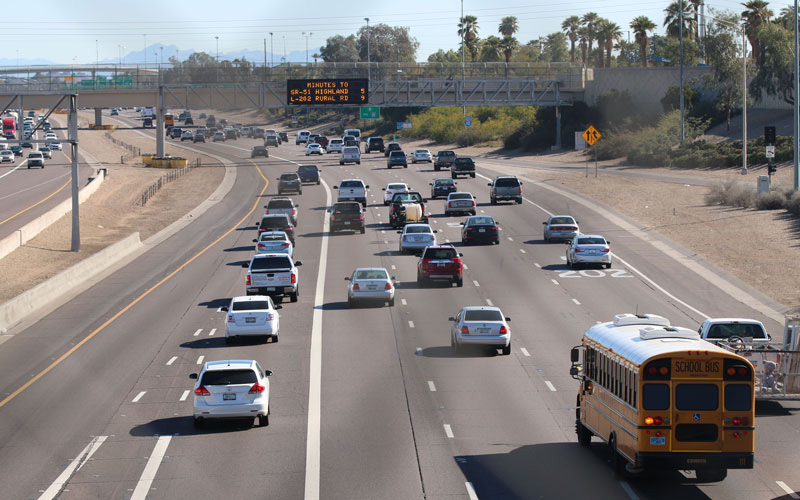
Senate Bill 1111 would indirectly raise premiums by increasing the liability standards required for minimum vehicle insurance coverage. (Photo by Gabrielle Abbott/Cronkite News)
PHOENIX – You might have to pay about $80 more on car insurance next year if a bill working its way through the state Legislature passes.
“It’s a tax on poor people,” said Sen. David Farnsworth, R-Mesa. But the benefits “by far” outweigh the costs, said Sen. Kate Brophy McGee, R-Phoenix.
Senate Bill 1111, introduced by McGee, would indirectly raise premiums by increasing the liability standards required for minimum vehicle insurance coverage.
People assume the minimum standards set by the state are good enough, McGee said, but the 45-year-old rates don’t cover increasing costs of cars, repairs and hospitals.
“When real life happens … (people) discover the hard way that they are not really covered,” she said. “When you consider the whole cost, (an adjustment is) overdue.”
Farnsworth, during the bill’s final vote in the Senate, said the current minimums are sufficient and raising them could land uninsured motorists in jail because it’s illegal to drive in the state without insurance.
“By increasing the limits … we are going to push people out of the market,” he said.
There are nearly 500,000 registered vehicles in Arizona without insurance as of January, a spokesman for the Arizona Department of Transportation said. The average cost of only liability coverage in Arizona was about $507 in 2014, according to the most recent estimates provided by the Insurance Information Institute, a national research group.
The national trade organization Property Casualty Insurers Association of America spoke against the bill.
“(Low-income people) are buying the minimum limits because they can’t afford further insurance,” association spokesman David Childers said.
The state requires insurance companies to offer minimum liabilities of $15,000 for one person injured or killed in an accident, $30,000 for two or more and $10,000 for property damage. The proposed increase would adjust rates to $25,000, $50,000 and $25,000, respectively. Companies would be required to make the changes by June 1, 2018.
The Arizona Insurance Institute, a local trade association, supports increasing the minimums.
“It’s a public safety standard because medical costs have gone up, and accident repair costs have gone up,” association spokeswoman Nicole Farr said.
The average cost for a crash with serious injuries grew by 51 percent for a single accident from 2005 to 2015, according to the Arizona Department of Transportation’s most recent crash reports. The costs grew each year until reaching a high of $90,270.
Injury lawyer Geoffrey Trachtenberg, who said his clients are most often poor, supports the bill. “It would increase premiums for smaller policies to the tune of $7 a month. To some, that’s a lot, but they are the same people that need protecting,” he said.
One of those people is Trachtenberg’s client, Flagstaff resident Lisa Garner.
Garner said she was riding her motorcycle on Highway 89 in Flagstaff when a drunk driver slammed into her from behind. “(The driver) ran me over partially,” she said. “She stopped on me and rolled back over me once again.”
Garner’s hospital bill was in excess of $200,000. The accident has prevented her from running her home business for the past four months. She has made and sold jewelry since 1995. It’s her sole source of income.
The Arizona Health Care Cost Containment System, the state’s Medicaid program, paid Garner’s hospital bill. However, she has to reimburse the state using the money she claimed from the accident, which is why she sought Trachtenberg’s services.
The driver had a minimum liability policy. Garner said she’s angry the accident “ruined” her life. “You can’t do anything with $15,000. You can’t even get back on your feet,” Garner said. “I almost died, and it’s like that’s all I’m worth. It knocks you down.”
McGee’s bill passed a final vote in the Senate with only four of her fellow Republicans in support. The bill passed mainly because of Democratic votes. The bill will have to pass the House of Representatives before reaching the Governor’s Office.
McGee doesn’t expect the bill to pass easily.
“The insurance lobbies are very strong,” she said. “They kept it off for 45 years, but I think it’s an urgent policy question we must ask, … debate and (consider).”